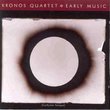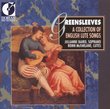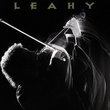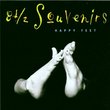| All Artists: Berenguier de Palou, Troubadour Anonymous, Giraut de Bornelh, Peire Cardenal, Raimon de Miraval, Ramon Llull, Guiraut Riquier, Bernart de Ventadorn, Jaufre Rudel de Blaye, Ensemble Unicorn Title: Music of the Troubadours Members Wishing: 0 Total Copies: 0 Label: Naxos Release Date: 6/1/1999 Genres: Special Interest, Pop, Classical Styles: Vocal Pop, Opera & Classical Vocal, Historical Periods, Early Music, Symphonies Number of Discs: 1 SwapaCD Credits: 1 UPC: 636943425725 |
Search - Berenguier de Palou, Troubadour Anonymous, Giraut de Bornelh :: Music of the Troubadours
 | Berenguier de Palou, Troubadour Anonymous, Giraut de Bornelh Music of the Troubadours Genres: Special Interest, Pop, Classical
|
CD DetailsSimilarly Requested CDs
|
Member CD ReviewsReviewed on 7/4/2008... Seventy minutes of twelfth- and thirteenth-century European secular music, dedicated to songs of the troubadours who sang of the ideal of love. BEautiful voices and arrangements.
CD ReviewsI TROVATORI DAVID BRYSON | Glossop Derbyshire England | 10/21/2004 (5 out of 5 stars) "Absolutely fascinating, and it goes without saying not much like Verdi. This is an illuminating selection of the music of the troubadours, part vocal part instrumental, dating from the 12th to the 14th centuries. The artists are two groups of specialists, representing it seems slightly different traditions in the performance of the music, but with previous experience of collaborating. Particular care was apparently given to the selection of the vocalist, the final choice being Maria Lafitte of Canso Catalana, a specialist not only in the music of the period but also in the mediaeval romance languages - Provencal and some near congeners - of the poetry we find here. The performances have a great deal of `presence' and what sounds to me like an air of authority. Maria Lafitte puts her heart and soul into all her contributions, and it should be taken as a compliment when I say that for me there was an odd suggestion of Piaf about her. With one exception, the mildly risqué # 9, all the vocal work is solo work. In # 9 I have to suppose the instrumentalists double as the choristers, since no other credits are given. The instrumental music (comprising about half of the disc) has not advanced at this stage beyond rudimentary harmony consisting of drone basses and percussion effects, but it is strikingly well recorded, particularly as regards parts of the percussion, and the liner note details the precise instruments used. What I would have liked to find in the note is rather more about the choice of instruments - is it specified in the scores or, as I suspect, did the specialist performers prescribe it themselves? As regards the vocal side, the liner note is completely admirable, pitching to an audience of newcomers to this music and packing in a lot of the historical background in a short space. There is also a brief section on the performers, the commentary is given in German and French as well as English, and there is a full text of the poems with English translation." Disappointed AND frustrated misternoodley | Arlington, VA United States | 01/20/2002 (3 out of 5 stars) "yeah, the musicianship is great, but i'm still going to add my agreement to those who would have preferred more authentic vocals (read, male) on this recording. it never ceases to amaze me how musicians, critics, and connoisseurs of early music quibble over the authenticity - or lack thereof - of every teeny note of the instrumentation, but give the totally inappropriate voice a pass. although i enjoy female vocalists as much as the next person, it looks like i'm one of the last folks on the planet who still adores a passionate male vocalist as well. this is a bummer, because it appears the latter is completely out of vogue regardless of the context. in a case as clear as troubadour songs, it's just flat-out unforgivable.that having been said, i'll add that i strongly disagree with the last reviewer who didn't enjoy lafitte's singing. in a different setting, i'd adore every note. in my opinion, the best performances of early music keep it passionate and very raw, and lafitte pulls off both rather nicely."
|

 Track Listings (12) - Disc #1
Track Listings (12) - Disc #1








